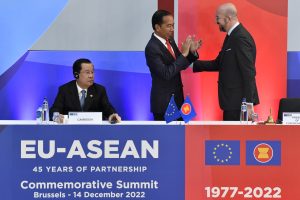Pushing ahead with a free trade agreement (FTA) between ASEAN and the European Union had topped the agenda at their recent “historic summit” in Brussels, but old chestnuts ensured that little more than back-slapping and platitudes prevailed.
As the veteran Indian diplomat Gurjit Singh politely noted, EU sanctions on Cambodia and Myanmar – over human rights abuses – would ensure that bilateral trade deals remain the priority and any EU-ASEAN FTA is still a dream.
“On its part, ASEAN is happy that it is being wooed by larger groupings like the EU at a time when both its unity and centrality have come into question,” he wrote recently.
The outgoing ASEAN chair, Cambodian Prime Minister Hun Sen, was keen to accelerate an FTA between the two trading blocs “as soon as possible” while arguing “we should not let political issues block free trade.”
It was a positive spin after a difficult year that highlighted divisions among the 10 nations of ASEAN in forming a consensus over Russia’s invasion of Ukraine, a response to civil war within Myanmar and dealing with Chinese maritime and territorial claims across the Indo-Pacific.
Hun Sen, Beijing’s closest ally inside ASEAN, made it plain that China’s influence deserves to be great. Five days after the summit he “highly commended China’s relentless support for maintaining ASEAN centrality and unity.”
He also maintained “the prestige of ASEAN in all aspects on the global stage is inseparable from the engagement of ASEAN dialogue partners, especially the People’s Republic of China,” noting it was the world’s second largest economic superpower.
Cambodia was not the only member to bring its political peculiarities to the table. Indonesia, which has taken over the rotating ASEAN chair for 2023, also seemed way out of step. Its stance on terrorism was not helped by the early release of the Bali bomber, Umar Patek, and a ban on sex outside of marriage, announced on the eve of the summit, was hardly the stuff that one would envisage when it comes to free trade in the modern world. This was – no doubt – blatant pandering to Islamic extremists as President Joko Widodo starts prepping for an election year in 2024 but given the importance of an EU-ASEAN FTA to industries like tourism, such decisions simply highlight the gulf in thinking between the two trading blocs.
Tourism is one industry that ASEAN countries are desperate to promote and is widely seen as a cash cow capable of alleviating the financial crunch currently faced by big business if the numbers of travelers can be lifted to pre-pandemic levels.
But many an ASEAN country suffers from poor perceptions abroad given the crackdowns on dissent, political opponents, journalists and trade unionists, among many others, by some of the authoritarians regimes that make-up ASEAN.
Few have little time for concepts like the separation of powers.
In a post-pandemic world, and before venturing into Southeast Asia, tourists need to be aware of the risks and think twice before supporting any of these regimes with their hard earned dollars.
It’s a mentality that EU Commission President Ursula von der Leyen was possibly mindful of when she gave ASEAN a giant pat on the back as Europe hosted the first EU-ASEAN summit in Brussels to mark their 45-year partnership. She noted the EU had already signed FTA deals with Vietnam and Singapore and said “that is impressive” adding “We want to trade more with each other. We already are each other’s third largest trading partners.”
“So the European Union wants to conclude more such agreements with ASEAN countries. And our ultimate goal would be to negotiate a region-to-region free trade agreement.”
In other words: No deal, so far.
































